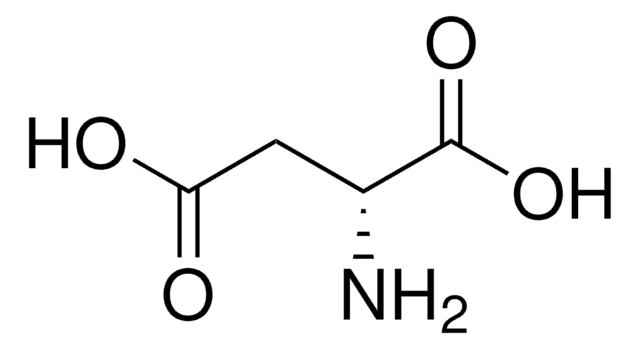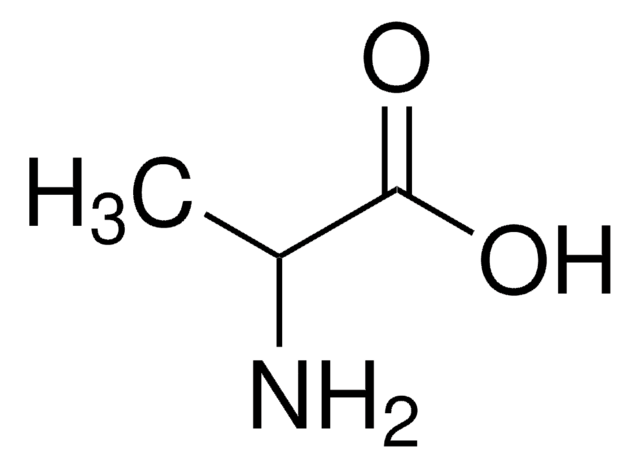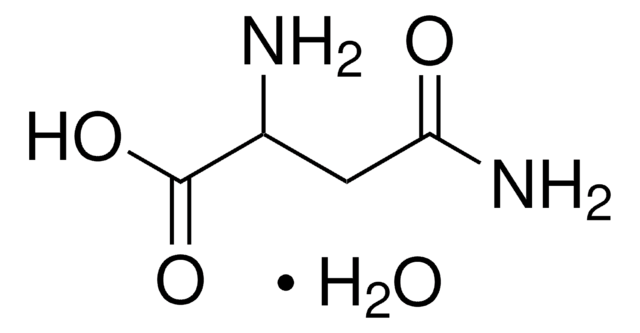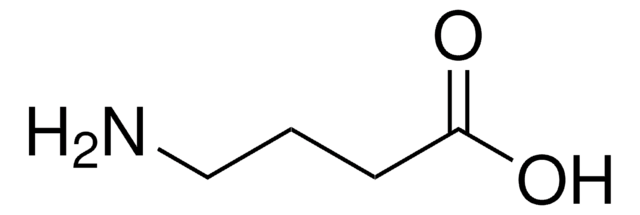A9006
DL-Aspartic acid
≥99% (TLC)
Sinonimo/i:
(±)-2-Aminosuccinic acid
Autenticatiper visualizzare i prezzi riservati alla tua organizzazione & contrattuali
About This Item
Formula condensata:
HOOCCH2CH(NH2)COOH
Numero CAS:
Peso molecolare:
133.10
Beilstein:
774618
Numero CE:
Numero MDL:
Codice UNSPSC:
12352209
ID PubChem:
NACRES:
NA.26
Prodotti consigliati
Nome del prodotto
DL-Aspartic acid, ≥99% (TLC)
Livello qualitativo
Saggio
≥99% (TLC)
Stato
powder
Colore
white
Punto di fusione
>300 °C (lit.)
Solubilità
1 M HCl: soluble
applicazioni
cell analysis
peptide synthesis
Stringa SMILE
NC(CC(O)=O)C(O)=O
InChI
1S/C4H7NO4/c5-2(4(8)9)1-3(6)7/h2H,1,5H2,(H,6,7)(H,8,9)
CKLJMWTZIZZHCS-UHFFFAOYSA-N
Cerchi prodotti simili? Visita Guida al confronto tra prodotti
Azioni biochim/fisiol
DL-Aspartic acid (DL-Asp) is a racemic mixture of the proteinogenic amino acid L-aspartate and the non-proteinogenic amino acid D-aspartate. DL-Aspartic acid is used in studies on factors and conditions that enhance semen and sperm quality.
Applicazioni
Codice della classe di stoccaggio
11 - Combustible Solids
Classe di pericolosità dell'acqua (WGK)
WGK 1
Punto d’infiammabilità (°F)
Not applicable
Punto d’infiammabilità (°C)
Not applicable
Dispositivi di protezione individuale
Eyeshields, Gloves, type N95 (US)
Scegli una delle versioni più recenti:
Possiedi già questo prodotto?
I documenti relativi ai prodotti acquistati recentemente sono disponibili nell’Archivio dei documenti.
I clienti hanno visto anche
Jannick Jacobsen et al.
Dalton transactions (Cambridge, England : 2003), 48(23), 8433-8441 (2019-05-23)
Six different chiral and achiral alkane dicarboxylic C4-acids, i.e. succinic acid (H2SUC), dl-2-methylsuccinic acid (H2MS), 2,3-dimethylsuccinic acid (H2DMS) and aspartic acid (d-, l- and dl-H2ASP), were used to obtain Ce(iv)-MOFs via microwave assisted reactions. In water-based syntheses, MOFs with three
Xiong Deng et al.
Biochimica et biophysica acta, 1851(12), 1521-1529 (2015-09-04)
In hyperinsulinemic states including obesity and T2DM, overproduction of fatty acid and triglyceride contributes to steatosis of the liver, hyperlipidemia and hepatic insulin resistance. This effect is mediated in part by the transcriptional regulator sterol responsive element binding protein-1c (SREBP-1c)
Sarah Schmidt et al.
Journal of leukocyte biology, 98(1), 5-14 (2015-02-04)
The deoxynucleoside triphosphate triphosphohydrolase and 3' → 5' exonuclease SAMHD1 restricts HIV-1 infection in noncycling hematopoietic cells in vitro, and SAMHD1 mutations are associated with AGS. Little is known about the in vivo expression and functional regulation of this cellular
Ann-Louise Johansson et al.
Proceedings of the National Academy of Sciences of the United States of America, 110(22), 8912-8917 (2013-05-16)
Proton transfer across biological membranes underpins central processes in biological systems, such as energy conservation and transport of ions and molecules. In the membrane proteins involved in these processes, proton transfer takes place through specific pathways connecting the two sides
Alexandre Gouzy et al.
Nature chemical biology, 9(11), 674-676 (2013-10-01)
Here we identify the amino acid transporter AnsP1 as the unique aspartate importer in the human pathogen Mycobacterium tuberculosis. Metabolomic analysis of a mutant with an inactive AnsP1 revealed that the transporter is essential for M. tuberculosis to assimilate nitrogen
Chromatograms
application for HPLCapplication for HPLCIl team dei nostri ricercatori vanta grande esperienza in tutte le aree della ricerca quali Life Science, scienza dei materiali, sintesi chimica, cromatografia, discipline analitiche, ecc..
Contatta l'Assistenza Tecnica.







